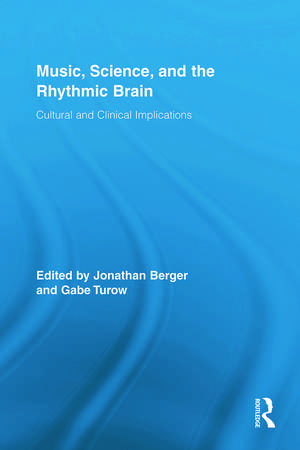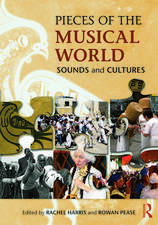Music, Science, and the Rhythmic Brain: Cultural and Clinical Implications: Routledge Research in Music
Editat de Jonathan Berger, Gabe Turowen Limba Engleză Paperback – 8 iul 2013
| Toate formatele și edițiile | Preț | Express |
|---|---|---|
| Paperback (1) | 463.62 lei 6-8 săpt. | |
| Taylor & Francis – 8 iul 2013 | 463.62 lei 6-8 săpt. | |
| Hardback (1) | 1055.51 lei 6-8 săpt. | |
| Taylor & Francis – 20 iul 2011 | 1055.51 lei 6-8 săpt. |
Din seria Routledge Research in Music
-
 Preț: 311.41 lei
Preț: 311.41 lei -
 Preț: 324.89 lei
Preț: 324.89 lei -
 Preț: 312.81 lei
Preț: 312.81 lei -
 Preț: 325.30 lei
Preț: 325.30 lei - 9%
 Preț: 935.57 lei
Preț: 935.57 lei -
 Preț: 312.28 lei
Preț: 312.28 lei -
 Preț: 290.00 lei
Preț: 290.00 lei -
 Preț: 383.06 lei
Preț: 383.06 lei - 19%
 Preț: 223.07 lei
Preț: 223.07 lei -
 Preț: 438.05 lei
Preț: 438.05 lei - 17%
 Preț: 256.32 lei
Preț: 256.32 lei - 18%
 Preț: 1000.45 lei
Preț: 1000.45 lei -
 Preț: 416.22 lei
Preț: 416.22 lei - 21%
 Preț: 257.49 lei
Preț: 257.49 lei - 18%
 Preț: 1000.27 lei
Preț: 1000.27 lei - 13%
 Preț: 310.55 lei
Preț: 310.55 lei -
 Preț: 324.68 lei
Preț: 324.68 lei - 18%
 Preț: 998.71 lei
Preț: 998.71 lei - 18%
 Preț: 894.39 lei
Preț: 894.39 lei -
 Preț: 312.14 lei
Preț: 312.14 lei -
 Preț: 489.26 lei
Preț: 489.26 lei - 18%
 Preț: 1002.99 lei
Preț: 1002.99 lei - 18%
 Preț: 1050.09 lei
Preț: 1050.09 lei -
 Preț: 437.55 lei
Preț: 437.55 lei - 18%
 Preț: 1119.87 lei
Preț: 1119.87 lei -
 Preț: 388.72 lei
Preț: 388.72 lei -
 Preț: 389.22 lei
Preț: 389.22 lei - 31%
 Preț: 765.03 lei
Preț: 765.03 lei -
 Preț: 420.08 lei
Preț: 420.08 lei - 18%
 Preț: 1003.93 lei
Preț: 1003.93 lei - 18%
 Preț: 1054.97 lei
Preț: 1054.97 lei -
 Preț: 391.14 lei
Preț: 391.14 lei - 18%
 Preț: 834.72 lei
Preț: 834.72 lei
Preț: 463.62 lei
Nou
Puncte Express: 695
Preț estimativ în valută:
88.72€ • 94.87$ • 73.97£
88.72€ • 94.87$ • 73.97£
Carte tipărită la comandă
Livrare economică 18 aprilie-02 mai
Preluare comenzi: 021 569.72.76
Specificații
ISBN-13: 9780415709484
ISBN-10: 0415709482
Pagini: 230
Ilustrații: 7 black & white tables, 27 black & white halftones, 15 black & white line drawings
Dimensiuni: 152 x 229 x 12 mm
Greutate: 0.32 kg
Ediția:1
Editura: Taylor & Francis
Colecția Routledge
Seria Routledge Research in Music
Locul publicării:Oxford, United Kingdom
ISBN-10: 0415709482
Pagini: 230
Ilustrații: 7 black & white tables, 27 black & white halftones, 15 black & white line drawings
Dimensiuni: 152 x 229 x 12 mm
Greutate: 0.32 kg
Ediția:1
Editura: Taylor & Francis
Colecția Routledge
Seria Routledge Research in Music
Locul publicării:Oxford, United Kingdom
Public țintă
Postgraduate and UndergraduateCuprins
Contents Acknowledgements Preface Part I: Research on Rhythmic Entrainment in Music 1: Introduction to Entrainment and Cognitive Ethnomusicology, Udo Will and Gabe Turow 2: Entraining the Brain and Body, Emil Jovanov and Melinda Maxfield 3: Rhythmic Entrainment and Evolution, Judith Becker 4: A Scientific View of Musical Rhythm, Matthew Wright 5: EEG Research Methodology and Brainwave Entrainment, Udo Will and Scott Makeig Part II: Clinical Implications of Rhythmic Entrainment Research 6: Using Rhythmic Auditory Stimulation for Rehabilitation, Concetta M. Tomaino 7: Binaural Beat Stimulation: Altering Vigilance and Mood States, Gabe Turow and James Lane 8: Audio-Visual Stimulation: Research and Clinical Practice, Thomas Budzynski, Helen K. Budzynski, Leslie Sherlin, and Hsin Yi Tang 9: Rhythmic Sensory Stimulation of the Brain: The Possible Use of Inexpensive Sensory Stimulation Technologies to Improve IQ Test Scores and Behavior, Harold Russell and Gabe Turow 10: Conclusion, Jonathan Berger
Descriere
This book studies the effects of repetitive musical rhythm on the brain and nervous system, and in doing so integrates diverse fields including ethnomusicology, psychology, neuroscience, anthropology, religious studies, music therapy, and human health. It presents aspects of musical rhythm and biological rhythms, and in particular rhythmic entrainment, in a way that considers cultural context alongside theoretical research and discussions of potential clinical and therapeutic implications. Considering the effects of drumming and other rhythmic music on mental and bodily functioning, the volume hypothesizes that rhythmic music can have a dramatic impact on mental states, sometimes catalyzing profound changes in arousal, mood, and emotional states via the stimulation of changes in physiological functions like the electrical activity in the brain. This comprehensive volume will appeal to scholars in cognition, ethnomusicology, and music perception who are interested in the therapeutic potential of music.

















